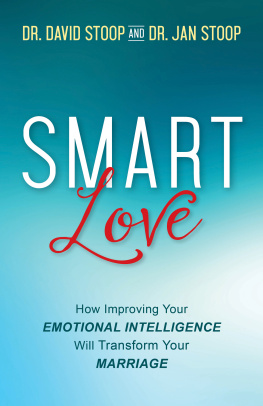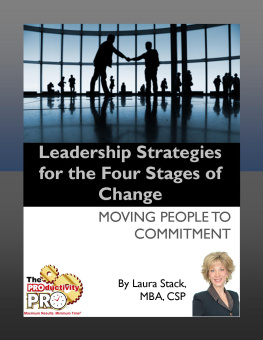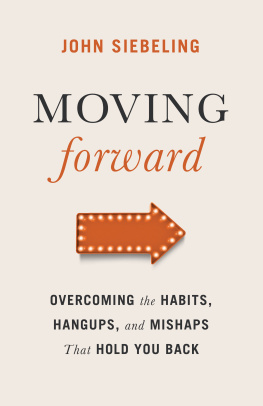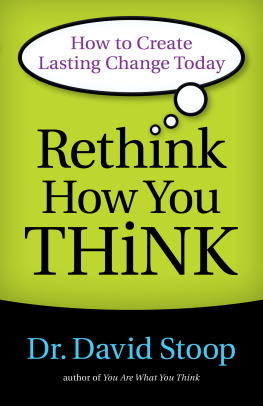Copyright Page
2014 by Dr. David Stoop
Published by Revell
a division of Baker Publishing Group
PO Box 6287, Grand Rapids, MI 49516-6287
www.revellbooks.com
Spire edition published 2018
Previously printed under the title Rethink How You Think
Ebook edition created 2018
All rights reserved. No part of this publication may be reproduced, stored in a retrieval system, or transmitted in any form or by any meansfor example, electronic, photocopy, recordingwithout the prior written permission of the publisher. The only exception is brief quotations in printed reviews.
Library of Congress Cataloging-in-Publication Data is on file at the Library of Congress, Washington, DC.
ISBN 978-1-4934-1490-1
Unless otherwise indicated, Scripture quotations are from the Holy Bible , New Living Translation, copyright 1996, 2004, 2007 by Tyndale House Foundation. Used by permission of Tyndale House Publishers, Inc., Carol Stream, Illinois 60188. All rights reserved.
Scripture quotations marked KJV are from the King James Version of the Bible.
Scripture quotations marked NIV are from the Holy Bible, New International Version. NIV. Copyright 1973, 1978, 1984, 2011 by Biblica, Inc. Used by permission of Zondervan. All rights reserved worldwide. www.zondervan.com
The author is represented by and this book is published in association with the literary agency of WordServe Literary Group, Ltd., www.wordserveliterary.com.
To protect the privacy of those who have shared their stories with the author, some details and names have been changed.
All italics used in Scripture are the authors emphasis.
Epigraph

Contents
Cover
Title Page
Copyright Page
Epigraph
Part 1
1. The Choice between Two Paths
2. The Physiology of Change
3. The ABCs of a Renewed Mind
4. Gods Plan for Our Transformation
Part 2
5. Moving from Fear to Love
6. Moving from Anger to Forgiveness
7. Moving from Loneliness to Connection
8. Moving from Lust to Intimacy
9. Moving from Modern Idolatry to Contentment
10. Moving from Lifes Trials to Joy
Afterword
Notes
About the Author
Back Ads
Back Cover
Part 1

The unifying word for our world today is stress . It is a common condition that affects us all, regardless of age. We want to be in control and we dont want to worry, but it seems that peace eludes us and stress overwhelms us. As Christians, we want the peace that Scripture describes as that which surpasses all understanding, but the harder we try to find it, the more we do not experience it. Why would the apostle Paul write so much about that kind of peace in the book of Philippians? What are we missing here? Why would he tell us we are to renew our minds in order to find that kind of peace? How does one go about such a process?
Paul gives us the outline in 2 Corinthians 10:35. He uses the metaphor of a battleground. We are to battle against the proud arguments that set themselves against God. Paul is echoing a theme found throughout the Biblethat there are two paths open to us. On one path, we believe those proud arguments against God, and on the other path, we think Gods way. But how can we change paths?
The work being done by todays brain scientists can give us added insight into ways we can rethink how we think, and in doing so, we can unlock the power that God has made available to us when we hide his Word in our heart.
Part 1 describes some of the incredible things our brains can doall of which are part of Gods design. Like the psalmist David, you will be amazed at how wonderfully God has made each of us.
Part 2

Now that we have looked at the basics of how our brains work, we turn to the specifics of how we can experience Gods transforming power in our lives. We hide Gods words in our hearts through meditation and memorization. And then we ponder Gods words throughout our day. So lets begin our journey of renewing our minds through meditation by looking at some of the things many of us want to change.
In each of the next chapters, we will look at a specific issue we may struggle with in our lives. We will begin each chapter by identifying the problem, then we will consider what goes on in our brain related to that specific issue. Our focus will then shift to meditating on Scriptures that relate to what God wants us to understand about that problem. Then we will consider another group of Scriptures that will help us understand more clearly Gods desired solution.
The Scripture passages are grouped together, making it easy for you to eat the passage. As you meditate on the Scriptures, note things that stand out to you. You may find it helpful to journal about what God says to you in each passage. Following your meditation on the passage and your reflections on what struck you, come back throughout the day to what the passage said to you. Again, think about what you readponder it. And especially think of it again as you end your day. Remember, Gods Word is alive and seeks to be active in our lives. Not every chapter may speak to a current struggle in your life. So feel free to focus on the chapters that are relevant to your needs.
Afterword
This is not just a book to read; it is meant to be experienced. You can start slowly, but until you allow yourself to spend at least thirty minutes four times a week on this journey, you will miss out on how incredible Gods plan is for helping you to rethink how you think. Real change is possible, but it requiresand heres that word we love to avoiddiscipline. We have to be serious about transformation. It cant be a hit-or-miss program. The psalmist said that he delighted in the law [Word] of the L ORD , meditating on it day and night (Ps. 1:2). He was serious about transformation in his life.
After you have spent some time meditating on the passages listed in the previous six chapters, you may want to continue by meditating on one of Pauls letters, such as Galatians. Or you may want to meditate on one of the Gospels. Continue the process wherever you choose. You can use a translation you are familiar with, or you may want to use a different translation so it is fresh for youeither way, the benefit is in the doing, and in staying with the process. Take a few verses at a time or focus in on a paragraph or two. I use the New Living Translation and often focus on a section of several paragraphs set apart in the text by a title. Its important not to try to cover too much at a time. But its up to you to gauge how much you want to bite off at once.
As you practice discursive meditation, you will find that your questions about the Scriptures and about doctrines become secondary to simply allowing the Scriptures to speak directly to your heart. Gods Word is living, and the apostle John makes that clear in his introduction to his Gospel. He wrote, In the beginning the Word already existed. The Word was with God, and the Word was God (John 1:1). It doesnt get any clearer than thatJesus is the Word. They are one and the same. When you truly encounter the Scriptures, you are encountering who Jesus isthe living God!














